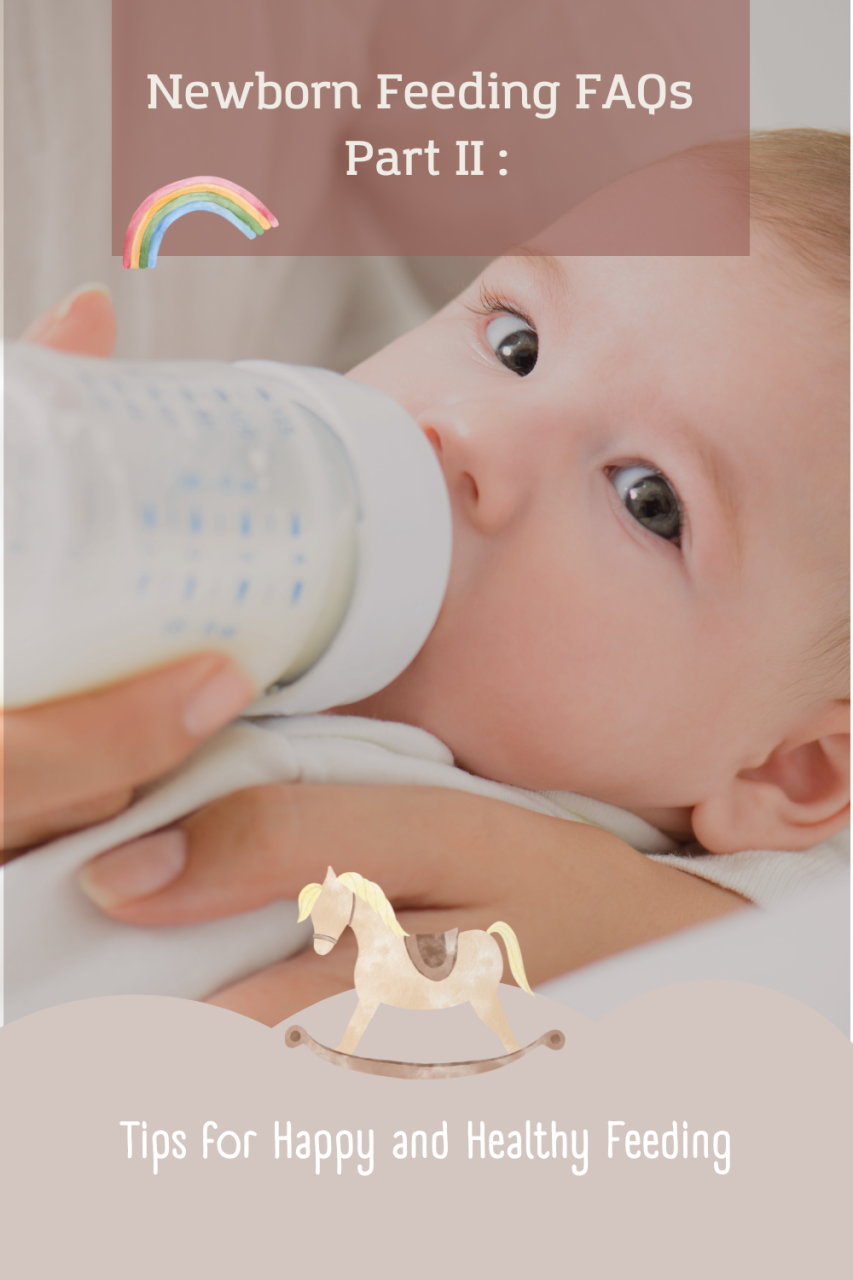Newborn Feeding FAQs- Part II : Tips for Happy and Healthy Feeding

Newborn Feeding FAQs- Part II : Tips for Happy and Healthy Feeding
1. Can I let my 1-week-old sleep through the night?
No, it’s generally not recommended to let a 1-week-old sleep through the night. Newborns need to eat every 2–3 hours because their stomachs are small, and they require frequent feeding to maintain their blood sugar levels and gain weight. If your baby sleeps longer stretches, you should wake them for feeding until your pediatrician confirms they are gaining weight appropriately.
2. When can you stop feeding a baby every 3 hours?
Most babies can go longer between feedings once they regain their birth weight, usually around 2 months old. By 2–3 months, they may feed every 4–5 hours during the day. However, this depends on whether they are breastfed or formula-fed and their overall health and growth. Always confirm timing with your pediatrician.
3. Can I give my baby milk I pumped at night during the day?
Yes, you can. Breast milk retains its nutritional value regardless of the time it was pumped. Breast milk can be used any time within proper storage guidelines.
4. Should I offer a second breast if the baby is asleep?
Yes, it's a good idea to gently wake your baby and offer the second breast, especially in the early weeks. This helps establish your milk supply and ensures your baby gets enough hindmilk, which is higher in calories.
5. Is it okay to put the baby to sleep without burping?
It’s best to try to burp your baby after feeding, as trapped air can cause discomfort and gassiness. However, some babies don’t burp after every feeding. If your baby is comfortable and not showing signs of distress, it’s okay to put them to sleep without a burp.
6. How to tell if a newborn is full? Will a baby unlatch when full?
A full newborn will often slow down sucking, unlatch themselves, or fall asleep at the breast. Signs of fullness include relaxed hands, a soft body, and turning their head away from the breast or bottle.
7. Do hiccups mean a baby is full? Does burping mean a baby is full?
Hiccups don’t necessarily mean a baby is full; they are a common reflex in newborns and can occur regardless of feeding. Burping indicates air has been released but is not a sign your baby is full.
8. How to tell if a baby is gassy? Can overfeeding make a baby gassy?
A gassy baby may cry, arch their back, clench their fists, or have a hard, bloated tummy. Overfeeding can contribute to gassiness because it overwhelms the baby’s digestive system, causing discomfort.
9. How quickly do breasts refill?
Breasts begin refilling immediately after feeding. Milk production works on a supply-and-demand basis, so the more frequently you nurse or pump, the faster your breasts will replenish milk. Most mothers produce a steady supply throughout the day.
10. Can you breastfeed at night and formula feed during the day?
Yes, many parents use a combination of breastfeeding and formula feeding. However, breastfeeding less frequently during the day might reduce your milk supply over time, so it’s essential to monitor your baby’s needs and your milk production.
11. When does colic start?
Colic typically starts around 2–3 weeks of age and can peak at 6 weeks. It usually resolves by 3–4 months. Colic is defined as excessive crying in an otherwise healthy baby and often occurs in the evening.
12. What is the 5-5-5 rule for newborns?
This rule suggests storing freshly pumped breast milk for:
- 5 hours at room temperature,
- 5 days in the refrigerator, and
- 5 months in the freezer (though some sources recommend up to 6 months for best quality).
13. What is the 4-2-1 rule for infants?
This rule is a guideline for weight-based fluid maintenance in pediatric medicine, where daily fluid needs are:
- 4 mL per kg for the first 10 kg of weight,
- 2 mL per kg for the next 10 kg,
- 1 mL per kg for each kg over 20 kg.
It is more applicable in clinical settings than daily parenting.
14. What is the 5-3-3 rule?
The 5-3-3 rule is often used for storing baby formula:
- Formula is safe for 5 hours at room temperature,
- 3 days in the refrigerator once mixed, and
- 3 months unopened in the pantry.
15. How to tell if a baby is waking from hunger or habit? How to tell if a baby is hungry or wants comfort?
A baby waking from hunger will often show signs like rooting, smacking lips, or sucking on their hands. If they are waking out of habit or seeking comfort, they may cry but calm down with a pacifier, rocking, or cuddling. Over time, you’ll recognize your baby’s hunger cues.
16. Do's and Don'ts for feeding/nursing a newborn baby?
Do’s:
- Feed on demand, watching for hunger cues.
- Ensure a proper latch to avoid discomfort and maximize milk transfer.
- Burp your baby after feedings.
- Keep your baby upright after feeding to reduce spit-ups.
- Monitor for signs of adequate intake (wet/dirty diapers).
Don’ts:
- Don’t force-feed if the baby is full.
- Avoid propping bottles for young infants; always hold them during feeding.
- Don’t delay feedings to stretch time between meals for newborns.
- Avoid introducing a pacifier before breastfeeding is well-established (around 3–4 weeks).
- Don’t skip nighttime feedings in the early weeks.
